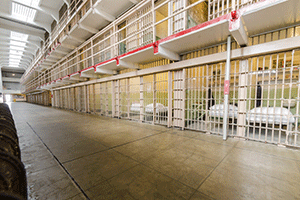The Museums Association Esmee Fairburn Collection Fund has awarded £120,000 to the National Justice Museum to introduce its unique 200-year-old HM Prison Service collection to a wider audience.
The funding supports a three-year project ‘Ingenuity, Creativity, Hope’ involving people in… more
Clinks have issued Under represented, Under pressure, Under resourced – the third and final report in a series looking at the voluntary sector's role in Transforming Rehabilitation.
Clinks surveyed 132 voluntary sector organisations between February and April 2017 and gathered six in-depth case studies. The survey results were analysed by the Third Sector Research Centre and by using the same questions posed in the 2015 survey they have been able to record changes over time.
As a result Clinks has identified seven key findings and made 11 recommendations that they believe can make a difference, and help to understand what the next generation of probation services could look like.
Since 2015, in response to feedback from members and other voluntary sector organisations, Clinks has led the tracktr partnership to undertake in-depth research into the voluntary sector’s experience of the changes to probation services brought about by the Transforming Rehabilitation reforms. Clinks have assessed the impact the reforms have had on organisations, the services they deliver, and the people they support; and will use the findings to advocate on behalf of the voluntary sector to government and to probation services run by the National Probation Service (NPS) and Community Rehabilitation Companies (CRCs).
Current experiences of Transforming Rehabilitation As TR has matured there has been a discernible shift in
YSS’s experiences. YSS has experienced “massive cuts” that has made YSS question the strategy being adopted by the CRC – “it seems to be about money and not the service user”. People Plus only deliver one CRC contract, YSS expressed concern that this might meant they could not achieve the same economies of scale that other CRCs could. It was assumed this might affect the overall cost of services and impact on their strategy and delivery model.

YSS have experienced a number of cuts to their services, one such example is the senior attendance centre service which was brought ‘in-house’ by the CRC. This was done without warning and the decision caused operational difficulties, for example the transition period had to be extended because the replacement service wasn’t ready in time. A significant issue for YSS was the lack of transparency in decision-making processes, the dialogue they were accustomed to with the Probation Trust and the early days of the CRC seemed to be dissipating. YSS said they weren’t ‘in the room’ or given the chance to contribute their views before these decisions were made. The ESS contract has experienced similar cuts – this includes through the gate service (TTG) provided by YSS. After one year, the CRC cut the through the gate element of YSS’ work by two thirds. YSS said they were not consulted with or included in the decision making process behind these cuts. This was followed by a two thirds cut to the main ESS service (from January 2018) despite continually operating at capacity with waiting lists to access the service.
YSS were consulted as part of this decision, and the main reasons behind the cut were: that the Ministry of Justice’s payment mechanism only recognising accredited programmes and unpaid work, and that lower than expected numbers of people under the CRCs supervision had affected the amount of money received by the CRC.



